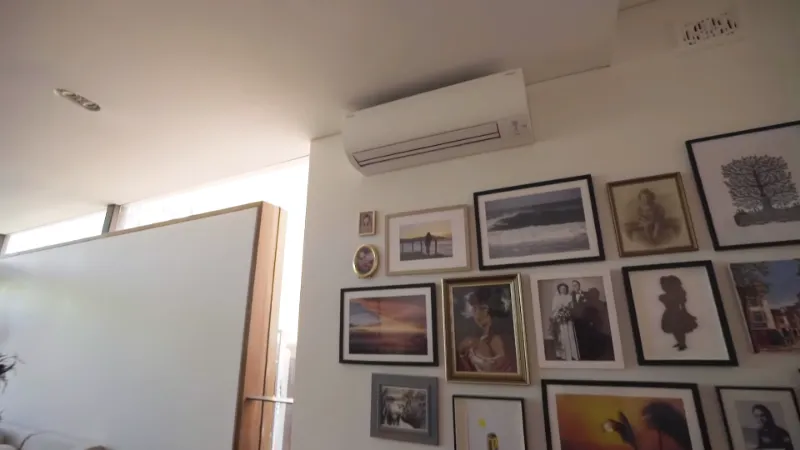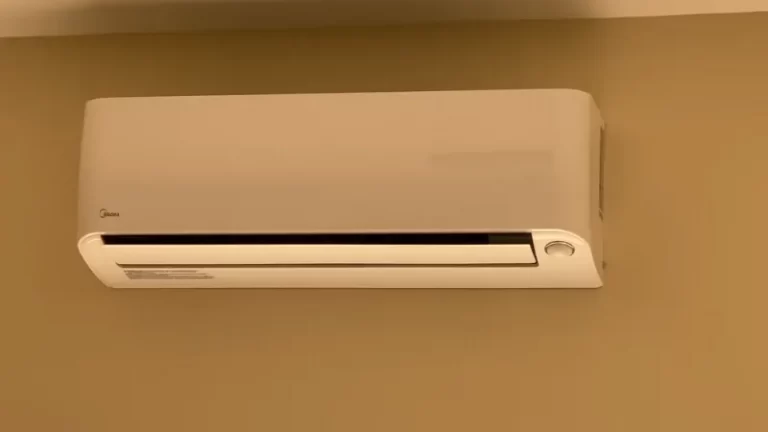Does Running A Dehumidifier Help Your Air Conditioner?

It is no secret that air conditioners can be expensive to run, but what if there was a way to make them more efficient? One option is to run a dehumidifier alongside your air conditioner. Dehumidifiers help reduce the humidity in the air, making it easier for your AC unit to cool the air.
But does running a dehumidifier really help your air conditioner? In this article, we’ll explore the benefits of running a dehumidifier in conjunction with your air conditioner and look at some of the potential drawbacks.
You'll Learn About
Does Running a Dehumidifier Help Your Air Conditioner?
A dehumidifier is an appliance that reduces the humidity level in an indoor environment. It is an important device to have in a home or business, as it helps to make the air more comfortable and prevent mold and mildew growth.
But does running a dehumidifier actually help your air conditioner?.
Benefits of Running a Dehumidifier
Running a dehumidifier in conjunction with an air conditioner can provide several benefits. One of the main advantages is that it can reduce the strain on the air conditioner. This is because the air conditioner won’t have to work as hard to reach the desired temperature if the humidity levels have been lowered.
This can help to increase the overall efficiency of the system and lead to lower energy bills.
Additionally, having lower humidity levels in the home can make the air feel cooler and more comfortable, even if the temperature hasn’t changed. This means that the air conditioner won’t have to run as often and your energy bills will be lower.
Considerations When Running a Dehumidifier
When running a dehumidifier alongside an air conditioner, there are a few things to consider. Firstly, be sure to place the dehumidifier in a place where it will be able to effectively remove humidity from the air.
Secondly, make sure that the dehumidifier is not blocking any of the air vents of the air conditioner. Lastly, when running the dehumidifier and air conditioner at the same time, make sure that the thermostat is set to a temperature that is comfortable for you.
Dehumidifier Tips
When using a dehumidifier, it is important to maintain it properly. Make sure to regularly clean the filter and empty the water tank or attach a hose for continuous draining. Additionally, it is important to check the humidity levels regularly and adjust the settings as needed.
In conclusion, running a dehumidifier in conjunction with an air conditioner can provide several benefits. It can reduce the strain on the air conditioner and make the air feel cooler and more comfortable.
However, it is important to keep the dehumidifier well maintained and check the humidity levels regularly.
Does a Dehumidifier Lower Ac Bill?
A dehumidifier is an electrical appliance that reduces the level of humidity in the air. It works by drawing in moist air, cooling it, and removing the moisture from it. The dry, cooler air is then released back into the room.
Benefits of Using a Dehumidifier
Using a dehumidifier can improve air quality, reduce odours and mitigate the growth of mould and mildew. It can also help to reduce the amount of dust mites and other allergens in the air, making it easier to breathe.
Does a Dehumidifier Lower Ac Bills
Yes, using a dehumidifier can lower AC bills. When the air is less humid, the air conditioner does not need to work as hard to cool the air, so it uses less energy. This helps to reduce energy costs and can result in lower AC bills.
How to Use a Dehumidifier Effectively
To get the most out of a dehumidifier, it should be placed in a spot that is out of the way and away from direct sunlight. It should also be cleaned regularly to ensure that it is working efficiently.
A dehumidifier can be a great way to reduce AC bills and improve air quality in a home. It works by drawing in moist air and removing the moisture from it, resulting in cooler, drier air that is easier for the air conditioner to cool.
With proper usage and maintenance, a dehumidifier can help to reduce energy costs and make a home more comfortable.
When Should You Not Use a Dehumidifier?
When deciding whether to use a dehumidifier, temperature should be the first consideration. Most units should not be operated in temperatures below 60°F, as the moisture removed from the indoor air can freeze when it condenses on the cooling coils, potentially damaging the unit.
Additionally, since humid air can hold more heat than dry air, running a dehumidifier in a cold climate can make it hard to keep your home warm.
Humidity Considerations
The second consideration when deciding when to use a dehumidifier is humidity. Dehumidifiers are designed to reduce humidity levels in a home, so if your home’s humidity levels are already low or normal, a dehumidifier may not be necessary.
The ideal relative humidity level for most homes is between 30% and 50%. If the humidity level is higher, a dehumidifier may be necessary.
Condensation Considerations
Another consideration is condensation. If there is condensation on windows or other surfaces in your home, it is likely that you have too much humidity in your home and a dehumidifier is necessary. To determine if you have too much humidity, you can measure the humidity level with a hygrometer.
Maintenance Considerations
Maintenance is also an important consideration when deciding when to use a dehumidifier. Dehumidifiers require regular maintenance in order to operate efficiently and to prevent damage to the unit. Maintenance tasks include cleaning the filter, emptying the condensate tank, and checking for any signs of damage or wear.
Energy Efficiency Considerations
Finally, energy efficiency should be taken into consideration when deciding when to use a dehumidifier. Dehumidifiers vary in their energy efficiency levels, so it is important to choose a unit that is energy efficient.
Additionally, it is important to operate the unit at its recommended settings to ensure that it is running as efficiently as possible.
How Long Should AC Run to Dehumidify?
An air conditioner needs to run for at least 15 minutes to start dehumidifying the air. This time frame can vary depending on the size and power of the AC unit. Larger units require longer run times to dehumidify properly.
Smaller units can dehumidify the air in less time. For the best results, the AC should be running for at least 30 minutes. The AC should be set to a cool temperature to maximize the de-humidification process.
The fan setting should be on high to ensure maximum airflow over the cooling coils. The AC should be allowed to run until the humidity in the room reaches a comfortable level. Setting the humidity level too low can cause the AC to run for an unnecessarily long period of time.
Regular maintenance of the AC unit can help to ensure it is running efficiently and optimally. You can also pour water to unfreeze AC.
How Many Hours a Day Should a Dehumidifier Run?
A dehumidifier should be run for at least 12 hours a day to keep the air in your home fresh and clean. This is an important rule of thumb to follow for optimal results. Not sticking to this schedule every day is acceptable, but it is important to be aware that running the dehumidifier more often can help keep the air in your home clean.
It is recommended to run the dehumidifier for at least 12 hours a day to ensure it is working properly. This will also help to prevent any mold from growing, which can be harmful to your health. If the humidity levels in your home are high, it is especially important to run the dehumidifier for 12 hours a day.
This will help to reduce the humidity levels and make your home more comfortable. Running the dehumidifier for long periods of time will also help to reduce allergens in the air. Keeping the dehumidifier running for 12 hours a day will help to keep your home feeling fresh and clean.
By following this rule of thumb, you can be sure that your dehumidifier is working optimally and keeping your home safe and healthy.
Should I Use a Dehumidifier Everyday?
Dehumidifiers can help reduce moisture and humidity levels in your home. Depending on your home and climate, you may need to use a dehumidifier daily. To get the most out of your dehumidifier, run it for at least 12 hours a day.
This will help you remove the most moisture from the air without using too much energy. A dehumidifier can help prevent mold growth and reduce musty odors. It can also help reduce dust mites and other allergens in the air.
It can also keep your home’s temperature more comfortable, saving on air conditioning costs. A dehumidifier can help protect furniture, clothing, and other items from moisture damage. Before using a dehumidifier, you should measure the humidity levels in your home.
As long as the humidity level is above 50%, you should use a dehumidifier regularly.
Do Dehumidifiers Make a Room Hotter?
Dehumidifiers are designed to reduce the humidity in a room. As they operate, they generate a small amount of heat. This heat is usually not noticeable to most people. This is because the amount of heat generated is minimal.
The dehumidifier also helps to make the air in the room feel cooler. This helps to balance out any warmth generated by the dehumidifier. The heat produced by a dehumidifier is not enough to make a room noticeably hotter.
In fact, the room may feel cooler due to the reduced humidity. Dehumidifiers are an effective way to reduce the humidity in a room. They do not make a room significantly hotter, but they can make it more comfortable.
Do Dehumidifiers Use a Lot of Electricity?
Dehumidifiers use electricity to remove moisture from the air. The amount of electricity used by a dehumidifier depends on its size and type. Smaller, more efficient dehumidifiers use less electricity.
Dehumidifiers are typically used in damp or humid climates. The EPA estimates that dehumidifiers account for less than 1% of annual electricity usage. However, in a humid climate, running a dehumidifier all the time can increase electricity usage.
The larger the dehumidifier, the more energy it uses, so it is important to choose the right size for your needs. It is also important to consider the energy efficiency rating of the dehumidifier you choose.
Regular maintenance of the dehumidifier is important to ensure it runs efficiently and doesn’t use more electricity than necessary. Dehumidifiers are an effective way to reduce moisture and humidity levels in a home, but it is important to consider the energy usage before purchasing one.
To Recap
Running a dehumidifier alongside your air conditioner can be a great way to reduce humidity and make your AC unit more efficient. By reducing the amount of moisture in the air, the air conditioner won’t have to work as hard to cool it, leading to lower energy bills.
However, there are some potential drawbacks to consider. For example, the dehumidifier will increase your electricity bill, and if the humidity is already low, it may not provide much benefit. Ultimately, it is up to you to decide whether running a dehumidifier is worth the cost.


